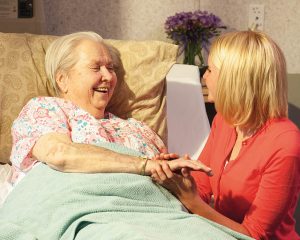Guest Blog: Strategies for fostering cooperation when caring for the elderly
When caring for the elderly, it can be tempting to feel as though you’re always in charge, and this can lead to treating those in your care like children. This can make what is already a difficult time even more so, as the elderly in your care will gradually feel as though they are losing any of the agencies they once had. Rather than approach care as though you lead, and they follow, why not tries an alternative view – a strategy based on cooperation.
It can be difficult to foster cooperation whilst caring for the elderly – many people are resentful of having to rely on someone else for help, and can actively reject what little you aim to do for them. No matter where you work or where your elderly relatives may be in care – whether it’s somewhere like Forest Healthcare or a simple food run once a week – it can be difficult work. There are some strategies you can use to deal with this, however.
Take an Interest
Firstly, take an active interest in those in your care. Get to know them as people. Remembering a couple of small details – whether it’s that their son is on holiday, or that they’re writing a letter to a cousin – and making the effort to ask about them will go a long way towards creating a sense of cooperation. If you’re treating them as an equal to you, and taking an interest in their life, then you are no longer some aloof figure, but a potential confidante. It doesn’t have to be a friendship by any means – but getting to know them as more than just one of many older people you help on a daily basis can go a long way.
Validate Them
Never make them feel stupid, or as though something you’ve discussed is irrelevant. Whilst some things the elderly people in your care might think desire or discuss may seem strange, it’s important to remember the huge difference in life experiences you’ve had. For instance, if they bring up something that’s bothering them that you might consider minor, treat it with the respect they deserve. Allowing the people in your care to remain autonomous is a vital step towards a working partnership.
Expect Resistance
You will be resisted. This is just a fact, and the sooner you accept it, the easier it is to deal with. Rather than being surprised and allowing you to get annoyed about it, treat it as what it is – just one step in a larger process? Try to figure out the root causes of the resistance – is it coming from a place of fear, perhaps of medical intervention? Or perhaps it’s resentment at their inability to do something themselves. Each person will be different, and treating resistance on an individual basis will make it easier to deal with in the long run.
Use ‘Trial Runs’
Imposing a particular routine, or type of medical care, on an elderly person can lead to them feeling as though they have no control. Instead, try to make use of trial runs – set a length of time for them to try something, and then meet to discuss it. This way they can make active, informed decisions about their own care – and you’ll often find that, given this opportunity, they’ll be happy to go along with what you suggested in the first place!
In general, what caring for the elderly mostly comes down to is remembering how things are from their point of view. To them, a move into care – no matter how great the care! – is a move away from independence, towards a more constructive way of life. In order to work towards cooperation, the best methods involve validating these feelings, acknowledging the difficulties, and trying to work around them. Therefore, anything that increases the autonomy and agency of those in your care is a great place to start. If you’re based somewhere like Forest Healthcare, then those decisions will be in your hands most of the day, but even in smaller, less frequent contact based care, it’s worth employing. If anything, the sooner you start working towards a cooperative strategy, the easier it will be for both of you in the long run.
Silversneakers: How Medicare’s Chic Fitness App Can Keep You Active
Fitness apps like Peloton and Nike Training Club are in vogue right now, offering live classes with personal trainers, on-demand workout videos, and access to workshops and support groups right from your phone, all for the price of a streaming subscription. It’s a workout revolution, but for many seniors it can be a bit too intense.
Some apps rely heavily on high-intensity interval training (HIIT), a workout style designed for the high-energy professional with only thirty minutes to spare. Others push expensive equipment like exercise bikes, treadmills, and fitness trackers. Most notably, nearly all of them are focused on the fitness goals of the younger generation: shedding extra pounds and getting toned and sexy.
A senior, however, has much different fitness goals. Yes, losing weight and improving your physique can be a wonderful goal at any age, but many seniors approach exercise as a way to stave off the effects of aging. Low-intensity exercise can bolster your independence by improving balance and preserving mobility, preventing dangerous falls. A good fitness program can help prevent heart disease, bolster your energy, boost your confidence, and improve your quality of life. The issue is finding one. Depending on your Medicare plan, you may already be eligible for one of the most comprehensive fitness plans on the market, all at no cost to you.
SilverSneakers offers all of the allure of those chic fitness apps in a senior-focused package. Not only can you access on-demand workouts as easily as clicking a YouTube video, but you also get access to a plethora of in-person benefits, including access to gyms and fitness facilities.
How does SilverSneakers work?
SilverSneakers is a perk offered through select Medicare Advantage plans. Medicare Advantage is a private alternative to Medicare Parts A and B, also known as Original Medicare, that combines hospital and medical insurance with benefits Medicare doesn’t usually offer, like vision or dental care. In exchange for committing to a specific insurance network, you can get lower premiums, reduced cost-sharing obligations, and perks like grocery cards and meal delivery. SilverSneakers is just one of many benefits these private insurers offer seniors, and it’s undoubtedly one of the more enticing.
When you enroll in a Medicare Advantage plan that includes SilverSneakers, you’ll be directed to download their app. This app, which is available on iOS and Android, includes live and on-demand classes covering various fitness topics. Their classic courses focus on improving balance, strength, and endurance, and are designed for seniors looking to improve their mobility and independence. If that’s not enough of a challenge, they also offer yoga, pilates, Zumba, tai chi, and strength training, among others. They also cover wellness-related topics like nutrition, mindfulness, and meditation.
What helps SilverSneakers stand out over the competition are their in-person offerings. Membership in SilverSneakers includes access to over 15,000 fitness locations, including national chains like Planet Fitness.
Typically, this includes access to all of that location’s amenities, including equipment, pools, hot tubs, saunas, and any nutritional counseling they may offer. SilverSneakers also coordinates in-person courses through their app, allowing you to find local classes and programs that interest you. The plan is 100 percent customizable: you can go to any participating fitness center, take any courses you like, and focus on the benefits you want. Only want to do yoga? No problem. Don’t want to leave the house? You don’t need to. Only interested in your gym’s hot tubs and saunas? You do you.
Because it’s part of your Medicare Advantage plan, you’re under no obligations or pressure to use it, and you’re not necessarily wasting money by skipping a gym visit. It’s just one part of your whole healthcare package, and it’s up to you to fit it into your lifestyle and fitness journey.
What’s the Catch?
If all of this sounds too good to be true, that’s because there are a few caveats that come with any Medicare Advantage plan, and with SilverSneakers in particular.
Private insurers offer Medicare Advantage, which means you’re bound to that insurer’s network. Unlike Original Medicare, which is accepted practically everywhere in the country, Medicare Advantage is usually only accepted by in-network providers. Some plans allow limited out-of-network services, but for the most part, you’ll need to stick with a more limited pool of doctors and specialists.
These plans are also limited to specific regions, meaning SilverSneakers may not be available in your area. Even if it is, there is also the risk of losing your benefits if you spend a significant amount of time away from your coverage area. While Medicare Advantage always offers the same benefits as Original Medicare, the limited network might be a deal breaker for some.
SilverSneakers is one of the best fitness programs available to seniors, and with no-cost access to fitness centers across the country, it has a major edge over the competition. However, it’s still important to be informed.
Speak with a licensed insurance agent, such as those available at MedicareInsurance.com, before enrolling in Medicare Advantage to ensure that your chosen plan meets your healthcare needs. Be sure to consult a doctor before beginning a diet or exercise program and read the privacy policy before enrolling in any online service.
Guest Blog: What to Expect from Andropause in Your Senior Years
Have you felt like your increasing age is taking a toll on you? As men increase in age, their normal hormone levels decrease and result in different types of male hormone imbalances. One of which is andropause or “male menopause” – a decline in a man’s levels of testosterone, their primary male sex hormone.
A gradual but significant decline in a man’s testosterone begins at age 30 at a rate of 1 to 2% per year. By about age 70, a man’s testosterone levels may have declined by 50%. Because testosterone plays a huge role in a man’s overall health, low T levels may produce different adverse effects.
Andropause and senior health
Here are the most common symptoms and changes you can expect from andropause in your senior years:
- Sleep disturbances: Sleeping difficulties or disturbances in andropause men include insomnia, sleep apnea, night sweats, and restless leg syndrome (RLS).
- Emotional changes: Different changes in emotions during andropause often result to a lack of motivation, depression, forgetfulness, and lack of concentration.
- Sexual dysfunction: During andropause, a man’s sexual function also weakens and lays low, which may result in low sex drive, infertility, and erectile dysfunction.
- Osteoporosis: With declining testosterone levels, men become more susceptible to osteoporosis. Low levels of testosterone lead to loss of bone tissue and mass.
- Physical changes: Other physical manifestations of andropause in men include increased abdominal fat, decreased muscle mass, hair loss, and swollen breasts.
Dealing with andropause
Although andropause can’t be escaped, it can be managed. Men can deal with the different symptoms and risks brought about by andropause with these simple steps:
- Weight management: Stored extra fat, especially in the belly, can convert testosterone to estradiol. Healthier lifestyle choices such as proper diet and regular exercise are greatly recommended.
- Physical activity: Engaging in physical activities can help alleviate unpleasant symptoms of andropause, such as mood swings and sleeping difficulties, while helping manage your weight.
- Proper nutrition: Practice eating healthier food choices including fiber-rich foods, omega-3 fatty acids, lean meat, and fruits and vegetables for overall health, increased energy, and strength.
- Getting checked for depression: Depression is one of the symptoms of andropause that you should keep an eye on. Beware of signs of depression or have your primary care provider screen you for possible depression.
- Expert consultation: The best way to deal with andropause is through an expert doctor’s help. Be honest about your symptoms for proper diagnosis and treatment. For some, testosterone replacement therapy can be given as an effective treatment.
Get equipped and be ready for the andropause battle!





